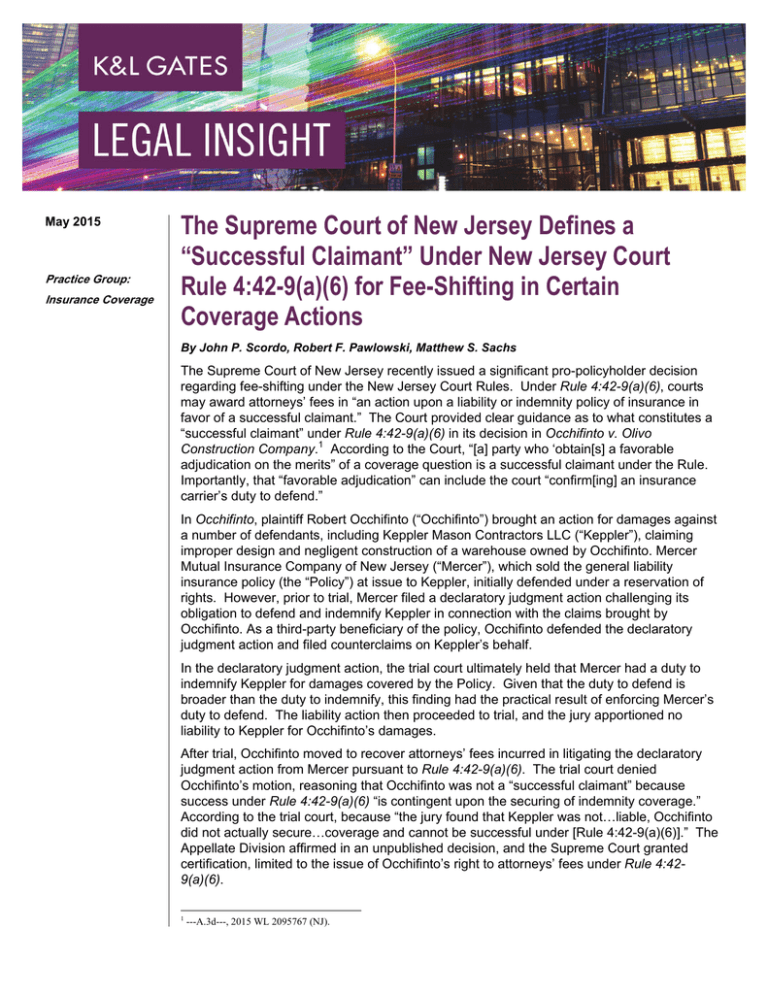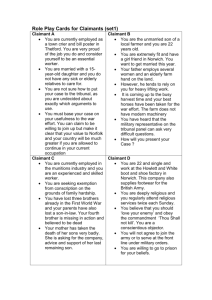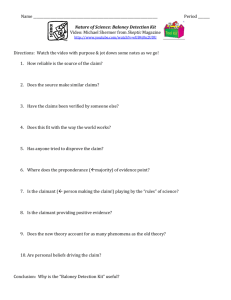
May 2015
Practice Group:
Insurance Coverage
The Supreme Court of New Jersey Defines a
“Successful Claimant” Under New Jersey Court
Rule 4:42-9(a)(6) for Fee-Shifting in Certain
Coverage Actions
By John P. Scordo, Robert F. Pawlowski, Matthew S. Sachs
The Supreme Court of New Jersey recently issued a significant pro-policyholder decision
regarding fee-shifting under the New Jersey Court Rules. Under Rule 4:42-9(a)(6), courts
may award attorneys’ fees in “an action upon a liability or indemnity policy of insurance in
favor of a successful claimant.” The Court provided clear guidance as to what constitutes a
“successful claimant” under Rule 4:42-9(a)(6) in its decision in Occhifinto v. Olivo
Construction Company.1 According to the Court, “[a] party who ‘obtain[s] a favorable
adjudication on the merits” of a coverage question is a successful claimant under the Rule.
Importantly, that “favorable adjudication” can include the court “confirm[ing] an insurance
carrier’s duty to defend.”
In Occhifinto, plaintiff Robert Occhifinto (“Occhifinto”) brought an action for damages against
a number of defendants, including Keppler Mason Contractors LLC (“Keppler”), claiming
improper design and negligent construction of a warehouse owned by Occhifinto. Mercer
Mutual Insurance Company of New Jersey (“Mercer”), which sold the general liability
insurance policy (the “Policy”) at issue to Keppler, initially defended under a reservation of
rights. However, prior to trial, Mercer filed a declaratory judgment action challenging its
obligation to defend and indemnify Keppler in connection with the claims brought by
Occhifinto. As a third-party beneficiary of the policy, Occhifinto defended the declaratory
judgment action and filed counterclaims on Keppler’s behalf.
In the declaratory judgment action, the trial court ultimately held that Mercer had a duty to
indemnify Keppler for damages covered by the Policy. Given that the duty to defend is
broader than the duty to indemnify, this finding had the practical result of enforcing Mercer’s
duty to defend. The liability action then proceeded to trial, and the jury apportioned no
liability to Keppler for Occhifinto’s damages.
After trial, Occhifinto moved to recover attorneys’ fees incurred in litigating the declaratory
judgment action from Mercer pursuant to Rule 4:42-9(a)(6). The trial court denied
Occhifinto’s motion, reasoning that Occhifinto was not a “successful claimant” because
success under Rule 4:42-9(a)(6) “is contingent upon the securing of indemnity coverage.”
According to the trial court, because “the jury found that Keppler was not…liable, Occhifinto
did not actually secure…coverage and cannot be successful under [Rule 4:42-9(a)(6)].” The
Appellate Division affirmed in an unpublished decision, and the Supreme Court granted
certification, limited to the issue of Occhifinto’s right to attorneys’ fees under Rule 4:429(a)(6).
1
---A.3d---, 2015 WL 2095767 (NJ).
The Supreme Court of New Jersey Defines a “Successful Claimant” Under New
Jersey Court Rule 4:42-9(a)(6) for Fee-Shifting in Certain Coverage Actions
New Jersey courts have long followed the American Rule prohibiting the recovery of counsel
fees from the losing party. However, in deciding whether Occhifinto was a “successful
claimant” for purposes of obtaining attorneys’ fees under Rule 4:42-9(a)(6), the Court first
explained that “counsel fees may be awarded in certain circumstances.” The Court made
clear that the purpose of the fee-shifting Rule was to “discourage[] insurance companies
from attempting to avoid their contractual obligations and force their insureds to expend
counsel fees to establish the coverage for which they have already contracted.”
The Court then defined the term “successful claimant.” According to the Court, that term is
“broadly defined as a party that ‘succeed[s] on any significant issue in litigation which
achieves some benefit the parties sought in bringing the suit.’” Specifically in the context of
coverage, the Court explained that “[a] party who ‘obtain[s] a favorable adjudication on the
merits on a coverage question as the result of the expenditure of [counsel] fees,’ is a
successful claimant under Rule 4:42-9(a)6).” The Court also noted that a “successful
claimant under Rule 4:42-9(a)(6) may include a party in a negligence action who, like
plaintiff, is a third-party beneficiary of a liability insurance policy and litigates a coverage
question against a defendant’s insurance carrier.” The Court reasoned that “an insurer’s
refusal to provide liability coverage may also, as a practical matter, preclude an innocent
injured party from being able to recover for the injury.”
Having defined the term “successful claimant,” the Court next addressed whether Occhifinto
had obtained a “favorable adjudication” on the merits of a coverage question in the
declaratory judgment action. The Court specifically focused on the duty to defend,
explaining that such a duty “is a ‘coverage question’ if the complaint alleges claims that
would, if proven, fall under the policy,” and, applying past precedent, held that “a party [to a
declaratory judgment action] who confirms an insurance carrier’s duty to defend qualifies as
a successful claimant even if there is no award of damages requiring indemnification.” Thus,
according to the Supreme Court, Occhifinto succeeded in the declaratory judgment action by
forcing Mercer to continue to defend Keppler in the liability action. The Supreme Court found
that “[b]ecause the trial court concluded in the declaratory judgment action that the complaint
filed in the liability action alleged claims that would, if proven, fall under Keppler’s liability
insurance Policy with Mercer, thereby enforcing Mercer’s duty to defend, Occhifinto was a
successful claimant entitled to counsel fees pursuant to Rule 4:42-9(a)(6).”
The Supreme Court of New Jersey’s decision in Occhifinto is significant for policyholders in
several respects. The Court has made clear that a policyholder need not realize or actually
receive any indemnity payments in order to qualify as a “successful claimant.” Instead, the
policyholder need only obtain a “favorable adjudication” on the merits of a coverage
question. This “favorable adjudication” can include a court’s decision to “confirm” an
insurance carrier’s duty to defend, even if the insurance carrier is already providing a
defense to the policyholder under a reservation of rights. Moreover, the Court in Occhifinto
made clear that third-party beneficiaries can enforce Rule 4:42-9(a)(6), even if the “favorable
adjudication” obtained by the third-party beneficiary is a defense for the insured.
Policyholders and third-party beneficiaries of insurance policies should be aware of the
Supreme Court’s decision in Occhifinto and its impact on their coverage disputes.
2
The Supreme Court of New Jersey Defines a “Successful Claimant” Under New
Jersey Court Rule 4:42-9(a)(6) for Fee-Shifting in Certain Coverage Actions
Authors:
John P. Scordo
john.scordo@klgates.com
+1.973.848.4136
Robert F. Pawlowski
robert.pawlowski@klgates.com
+1.973.848.4032
Matthew S. Sachs
matthew.sachs@klgates.com
+1.973.848.4121
Anchorage Austin Beijing Berlin Boston Brisbane Brussels Charleston Charlotte Chicago Dallas Doha Dubai Fort Worth Frankfurt
Harrisburg Hong Kong Houston London Los Angeles Melbourne Miami Milan Moscow Newark New York Orange County Palo Alto Paris
Perth Pittsburgh Portland Raleigh Research Triangle Park San Francisco São Paulo Seattle Seoul Shanghai Singapore Spokane
Sydney Taipei Tokyo Warsaw Washington, D.C. Wilmington
K&L Gates comprises more than 2,000 lawyers globally who practice in fully integrated offices located on five
continents. The firm represents leading multinational corporations, growth and middle-market companies, capital
markets participants and entrepreneurs in every major industry group as well as public sector entities, educational
institutions, philanthropic organizations and individuals. For more information about K&L Gates or its locations,
practices and registrations, visit www.klgates.com.
This publication is for informational purposes and does not contain or convey legal advice. The information herein should not be used or relied upon in
regard to any particular facts or circumstances without first consulting a lawyer.
© 2015 K&L Gates LLP. All Rights Reserved.
3




